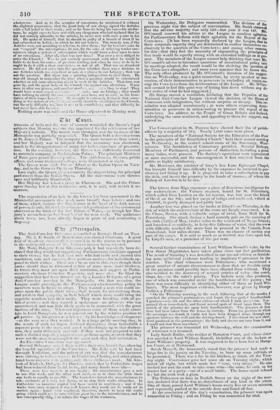The Anti-Corn-law Deleentes assembled au Brown's Hotel on Tues- day.
Mr. J. It. Smith, of alenchester, was elected Chairmau. A good deal of desultory conversation occurred as to the course to be pursued in the anticipeted event of Mr. Vieliers's motion being rejected.
Mr. Weir, Delumute from Glasgow, sidle it had veratedly been de- eared that they would not support any Parliamentary candidate opposed to their views; but he 1nel seen men who had made and cheered this resolution, vote and caneeee, from lmrtisan motives, for individuals op- posed to their wishes. There inteut he an cud to this, even though their ranks should thus be winnowed at first of some more timid brethren. In future they must act upon their resolution, and support at Parlia- mentary elections Corn-law Repeaters, and none els:. lie lilted the suggestion that had been thrown out by a London Dslegam, of a great Anti-Corn-law meeting in the Metropolis. Ott that occasion, the League could promulgate the Parliameutary-clectioneering policy its members were in future to adopt. They wanted a nein who could im- press upon the public their views, their reason fbr entertaining them, and awaken that sympnthy in their behalf' which alone could bring the requisite numbers iudo their ranks. They were breaking with all po- litical parties ; and they Wanted a spokesman—an advoeate who was unconnected, and was little likely again to lie connected, vriIi the great factions of the stale. 11'h3teVer ObiCCCIOIIS some of them might enter- tain to Lord Brongham, he was pointed out by his relative position to 011 parties—by his genius as a deb: ter---by his knowledge and eloquence --as the very man they wanted. If in a large public meeting they, in the words of such an organ, declared themselves from heneefbrth a separate party hi the state, and tuned unflinchingly up to that declara- tion, they must ultimately succeed : if they were not prepared to take such a decided step, they ri.i ht at user.. go home again, assured that they were not the men to aceemplish the ,ereat task they had undertaken.
An Executive Committee wae up; ,Stuted.
Several Delegates stated fiefs w it!Ilit their own kaowledge, showing the baneful' operation of the Corn-laws. 'Mr. Jolly said he had been
through Yorkshire, and the imiversel cry was that the manufiteturers were striving to reduce wee es : in iiiackb un, Chorley, and other places,
hand-loom weavers se.....t'gu ttin, 1);11:• tbrce shillinurs a week. Mr. Kin- loch of Kinloch, Deleeate 1/undee, stated, that in Vorfarshire wages had been reduced from es. nue to 6s., and many hands were idle— There were two weav,rs in one family : the manul'acturer gave a web to one this week, and the other next week, so as to share the little there
was to do as equally as possible. The Corn-laws forced the manufacturers to
take contracts at at very low figure, or to stop their works altogether. In Forfarshire an immense capital bad been vested in machinery ; and if the works were once stopped, it was well known they could not be easily set in motion again: hands were employed, tho shire, merely to keep the works going, which could not It done without great lots to the manufecturer, and he wee consequently obliged to reduce the wages of his workmen. On Wednesday, the Delegates reassembled. The division of the previous night was the subject of conversation. Mr. Smith observed that the adverse majority was only 123—last year it was 147.. Mr. O'Connell renewed his advice to the League to combine agitation for Parliamentary Reform with their agitation for the Repeal of the Corn-laws. [It has been repeatedly declared by the League, that in their corporate capacity they are determined to confine themselves ex- elusively to the question of the Corn-laws ; and among othpeorlireeyasoin: for this—that they feel the necessity of expounding the principles of free trade would be equally strong with an extended suffrage as at pre- sent. The members of the League cannot help thinking that were Mr, O'Connell's advice to introduce questions of constitutional
its meetings adopted, the result would be the shelving the question of the Corn-laws altogether ; and some even murmur that he knows this. The only effect produced by Mr. O'Connell's iteration of his sugges- tion on Wednesday, was a quiet reassertion, by every speaker in sue. cession, of their determination to persevere itt excluding all topics ex.
cept the Corn-laws front the deliberations of the League. Mr.Thisre O'Con- nell seemed to feel this quiet way of letting Mtn down without any di- rect notice of' what he had suggested.] Mr. Sturge moved a resolution, declaring that the Deputies of the National Anti-Corn-law League viewed the decision of' the House of C0111111011S with indignation, but without surprise or dismay. solution was adopted unanimously ; as were others expressing deter. mutation to persevere in endeavouring to procure the repeal of the Corn-laws. Au address to the People of Great Britain and Ireland, embodying the same sentiment, and appealing to them for support, was agreed to.


























 Previous page
Previous page